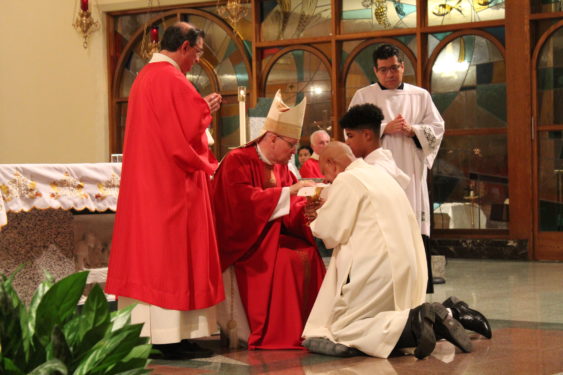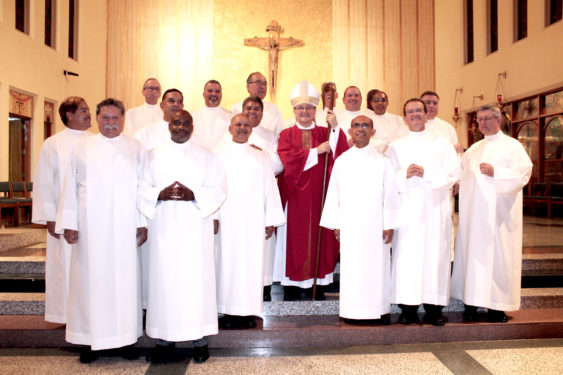By Marietha Góngora

In a solemn liturgical ceremony, the Diocese of Brooklyn received 18 permanent deacon candidates into the ministry of acolyte at a Mass celebrated by Auxiliary Bishop James Massa at St. Nicholas of Tolentine Church, Jamaica, Sept. 14.
The celebration, which coincided with the feast of the Exaltation of the Cross, was attended by teachers, pastors, relatives and friends of the deacon candidates.
As acolytes, these men will assist the priest and deacon at their home parishes at Mass, prepare the altar and the sacred vessels, and if necessary, distribute the Eucharist to the faithful as an extraordinary minister.
“All of us here tonight honor your hard work and commend you for arriving at this auspicious moment on the journey,” Bishop Massa said, addressing the men, who anticipate ordination to the permanent diaconate next May.
“Your families, your parishes, your brother deacons throughout the diocese join together in a single chorus of congratulations as you take this important step tonight.”
Called By Name
Deacon Jorge González, director of the diaconate program, called each of the candidates by name and invited them to stand before the bishop and congregation.
Bishop Massa highlighted the dedication and discipline that the new altar servers have had during four years of their formation.
“The Cross is the directional arrow in the spiritual compass of our lives. The Cross defines how we are to live and love within our families and among our friends and neighbors. … The Cross is the way of Catholic Christianity; it’s the only way of following Jesus,” the bishop said.
Judges, Heals, Engenders
He told the acolytes, “as future preachers of the Word, you candidates know well that the Cross has a multitude of meanings. Allow me to mention three of them that are verbs or actions flowing from this saving instrument: First, the Cross judges. Second, the Cross heals. Third, the Cross engenders life.”
“As acolytes, you administer the love that heals us every time you offer the chalice to someone on the Communion line. You’re the Beloved Disciple pointing to the Cross each time you say: ‘The Blood of Christ.’ More powerful than the bronze serpent is the precious cup you hold that contains healing for all eternity,” he said.

Bishop Massa concluded his homily by emphasizing the permanent support of the men’s families.
“Brother acolytes, God has begun a good work in you, and in your spouses and families, who support you in this vocation within the vocation. Christ has planted the love of his Cross within your hearts. Live from that center. Minister from that center. The Church of our time needs your witness, because its recovery depends, as it always has, on returning to her source.”
‘Make Your Life Worthy’
After the homily, the rite of institution of the candidates in the ministry of acolyte began. They formed two rows along the central aisle in front of the altar. One by one, they approached and knelt in front of the bishop, who handed them a vessel with bread or wine and told them: “Make your life worthy of your service at the table of the Lord and of His Church.”
The bread and wine was later consecrated during the liturgy of the Eucharist.
Regarding the process of the newly admitted into the ministry of acolyte, Deacon González explained that their formation for the permanent diaconate began with a “first year of discernment, prayer, and growth in their spiritual life – what we call the aspirancy – and then three years of theological formation. It has been a long effort of study and work in the parish, spiritual direction and mentoring that they have received.”
When they are ordained as permanent deacons next spring, Bishop Massa said, they will be serving “not only inside the church, but also outside,” addressing the needs of the parish and wider community.
